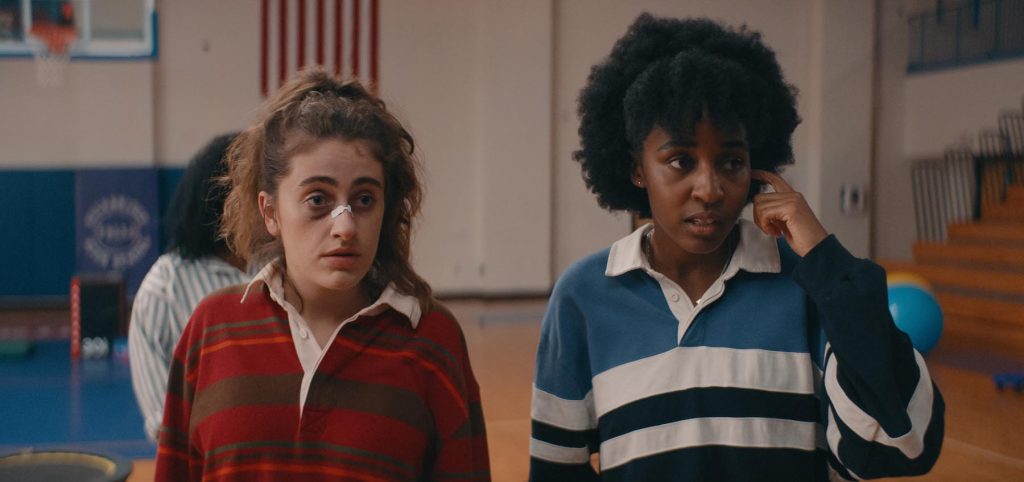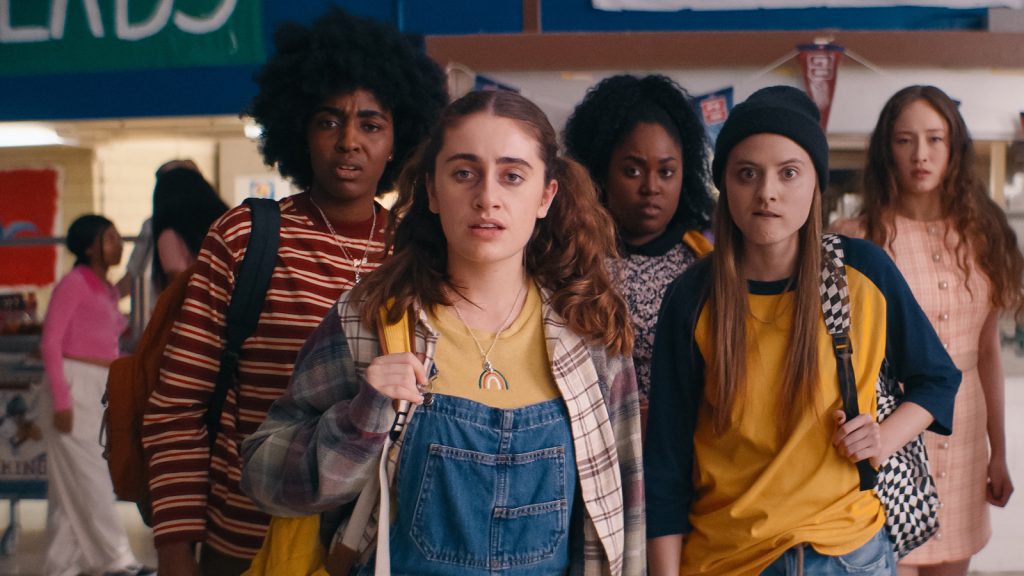A whole sub-genre of films exists purely to dwell on teen boys’ obsession with sex: American Pie, Fast Times at Ridgemont High, Porky’s, and a million icky ‘80s movies whose covers titillated video store customers for years. Meanwhile, girls rarely get in on the cinematic fun, despite the fact that they’re horny too. (Sorry, Mom.) Sure, audiences have occasionally been blessed with female-centric offerings like Kay Cannon’s Blockers and Maggie Carey’s The To Do List, but young women aren’t frequently seen as consumed by sex as their male counterparts inevitably are. When teen girls are interested in sex on screen (mostly in movies made by men), it’s usually only in response to or to provoke male desire. It’s almost never a thing all its own—or made without male desire figuring into it at all. Enter director Emma Seligman’s Bottoms, a rowdy raunch-com about a pair of high-school lesbian BFFs so crazy for cooch that they’ll risk getting punched in the face for a taste.
PJ (co-writer Rachel Sennott) and Josie (Ayo Edebiri) are either hated or ignored by practically everyone in their school, and it’s not because they’re lesbians. Societal progress means that PJ and Josie are ostracized because their classmates see them as ugly and untalented. Desperate for the attention of beautiful cheerleaders Isabel (Havana Rose Liu) and Brittany (Kaia Gerber), PJ and Josie start a women’s fight club under the auspices of sisterhood and self-defense. With Mr. G (Marshawn Lynch) as their unlikely staff sponsor, the girls get close to their crushes and make friends—who beat the living hell out of each other. You know, for feminism.
That plot description sounds a little ridiculous, but Bottoms is even more bonkers than the above paragraph implies. With its over-the-top violence and satiric take on both high school movies and high school itself, there’s no attempt at realism here (though don’t be surprised if Fox News freaks out over the rise of teen lesbian fight clubs just to incite hate and fear in its audience). The script from Seligman and Sennett is intentionally absurd, and it’s elevated into further insanity by the wildly funny performances of everyone here.
Longtime collaborators Sennott and Edibiri are awkward and amazing as the ring leaders with questionable motives and chemistry just as strong together as with the objects of their affection. Retired football great Lynch—who is solely disproving the idea that god doesn’t give with both hands—is a genius of comic timing and delivery, demonstrating that his hilarious guest appearance on Murderville wasn’t just a lucky fluke. As the beloved quarterback who rules the school, Nicholas Galitzine is perfectly silly.

Yet for all its exaggerated humor, Bottoms does have pointed and authentic things to say about friendship, feminism, and female desire. Its commentary is smart, even if it’s cloaked in the guise of a dumb comedy about two virgins who are desperate to have sex before they go to college. Similarly, Seligman isn’t content to let the film coast on its (very good) script; she brings a distinct visual style where the camera and editing contribute to the humor in a way that most comedies overlook, thinking that their cast and dialogue will be enough. This shouldn’t be a surprise; Seligman and Sennett’s previous collaboration, Shiva Baby, was a 77-minute master class in darkly funny cringe and a hell of a directorial debut for Seligman.
While Shiva Baby was so specific in its setting, Bottoms intentionally obscures where and especially when it takes place. A line of dialogue late in the film establishes that we’re in roughly 2023, but there’s been a slipperiness to the proceedings throughout the movie. With current Gen-Z style aping the ‘90s and ‘00s, the teens’ clothing isn’t a clear indicator of the movie’s time. Smartphones and social media are almost entirely absent (save a brief appearance by a flip phone), giving Bottoms a throwback quality, even while its progressive ideas about gender and sexuality firmly establish it in the present. The script doesn’t contain pop culture references that might date it, and the soundtrack swerves from King Princess to Bonnie Tyler, then from Avril Lavigne to Charli XCX (who composed the score with Leo Birenberg). It’s at once nostalgic and modern, giving it the feel of a film that could’ve come out in the ‘80s or could find favor with Generation Alpha in a few years when they’re old enough to watch R-rated movies.
Bottoms features delightfully dirty dialogue, but it’s surprisingly chaste in what it actually shows (which makes sense, given that these characters are meant to be still teenagers). Yet for all that it doesn’t depict sexually, it is explicit in its violence. “Girl fights” in pop culture generally consist of slaps, scratches, and hair pulls, but Bottoms has teen girls punching the absolute shit out of each other, resulting in bloody noses, black eyes, and gasps from the audience. It also pulls no punches in how these people treat each other. Seligman’s movie is mean in only the way that a film about teenage girls can be. (I say this as a former teen girl.) A particularly bruising moment is followed by the recognizable opening notes of a Lavigne chart-topper, leaving pop-music-loving Millennials laughing at a moment of real emotional and physical pain. It feels like a brief misstep and a step down from Shiva Baby, which smartly navigated tricky tones in a way that was surprising from a first-time filmmaker.
Despite these minor flaws and a bit of messiness, Bottoms is generally a blast. It’s the type of dark comedy that evokes constant snorts and giggles—and a momentary flash of embarrassment when you’re the only one who audibly snickered at that joke about suicide. Seligman and Sennott have made a hybrid of Fight Club and Heathers for Generation Z, giving voice to all the horny girls and queer teens who have rarely had movies made just for them.
B+
“Bottoms” is in theaters tomorrow.

